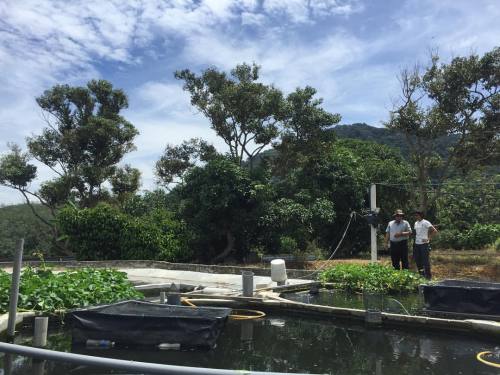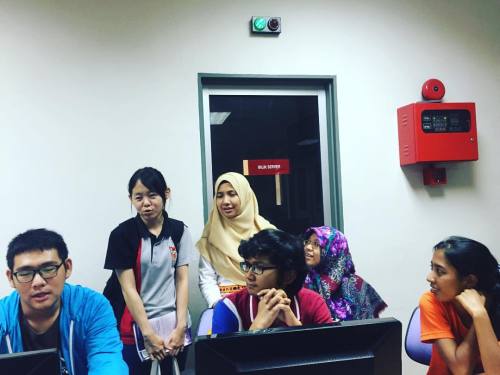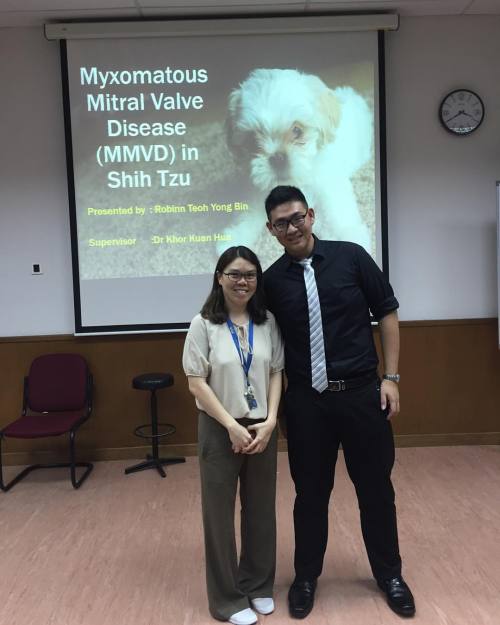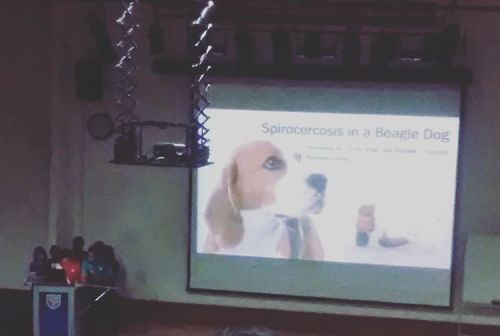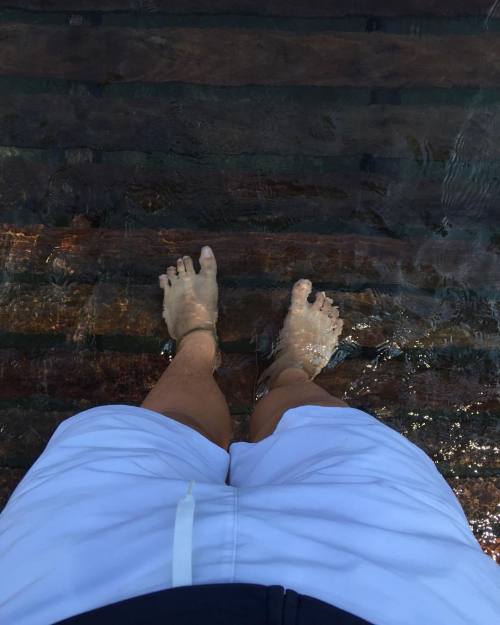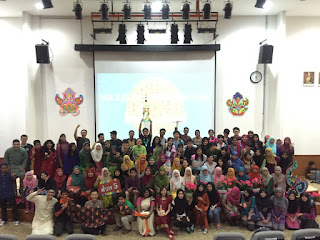That must have been a record since my STPM days.
Well, I really have to admit, 5th year is VERY tiring. No wonder the seniors back then had to stop blogging after stepping into clinical years.
Before I go for the drama I have, let's have a good recap on what we had this semester :
1- Problem based learning in veterinary problem solving:
This course basically allows us to put our knowledge into situational problems and try our best to get a good timeline of how things happened, why they happened, what are the mechanism involved, who are the ones will be involved, where the problem actually arose and what can we do about it as veterinarians. It was an interesting course, I had to say that it was even more because I was the course rep; we had a fair share of fun with the highlight of us even writing and putting up a play as a presentation with a little coaxing from our group facilitator. The play was on Melioidosis, a zoonotic disease (disease transmitted from animals to humans) usually exposed to farmers and veterinarians alike. Animals usually only experience abortion or certain neurological symptoms; but humans get more extensive problems like undulating fever, pneumonia, joint pains and etc.
2- Exotic and wildlife medicine:
As the name suggested, its medicine of the exotics and wildlife. I personally think that I've learned more practical medicine in raptor medicine as compared to other kind of species like reptiles, amphibians, rodents or rabbits. This most probably was due to the fact that the latter species involved little to none exposure or practice during our rotations for which we can not even begin to apply what we have learned, let alone to actually take interest. The past year papers did have subjects on primate, elephant and deer medicine which I'd actually have interest, but the lecturer is on his study leave, so yea it got anticlimactic over there. I would consider raptor medicine if I have the chance, because raptors are just so cool! PS: The dude above is a Jambut Fruit Dove, native to Malaysia and usually reside in tropical rain forest. It was confirmed a male because females are not usually so handsome, only in green feathers. Sexual dimorphism at its best by nature!
3- Ruminant medicine:
For those who do not know what ruminants are; they are the animals with 4 stomach chambers. Does that ring any bells? Yea, the cattle(cows if you don't know), goats, sheep, camelids, and some times even deer. But we focused a lot on cattle and goat because they are more common as compared to their other counterparts. We focused a lot on infectious and management diseases because the traumatic or anatomical related diseases were covered in surgery. I always thought I would actually pay a lot of attention on this subject, because I loved them since I stepped into vet school. To my horror I had little to no will to pay attention in class, for which most of the time I was struggling to pay attention. In the back of my mind I seriously think that our curriculum and rotation probably have created some form of aversion of me towards the ruminant industry, but I really do try to keep my head in the game in learning about how the diseases come about, their pathogenesis, ways to know that its the disease for sure as well as the treatment and prevention methods. It's basically the same as other medicine subjects, but really, I thought I would love it more though.
3- Aquatic medicine
It was literally all about fishes and prawns. Like literally. I would say this is the subject everyone struggled, apart from those who had immense interest in aquatic medicine. I wouldn't say I struggled, because I actually do enjoy the classes, and only dozed off because I was too tired from night duties in rotation. Basically we learn about the anatomy and physiology of fishes and prawns, their management, the basic diseases we faced in Malaysia and how to overcome them, as well as some anaesthesia about aquatic lifeforms. We did not have marine mammals in this picture, probably because marine mammals are probably, not in the class of fishes to begin with. I actually digg this subject, but I wouldn't say I love it to the max. I'd actually enjoy most of the lectures when they made sense; probably about 20% didn't.
4- Veterinary Business
Despite everyone loathing about this subject, I would say the exposure to economical terms actually made sense. The whole subject went underrated because we had to make classes from 5 to 8pm ridiculously to make time for those who wish to have electives where lecturers are of high priority. Talk about monarchy? Anyways, this course is pretty damn underrated as well because I feel like the disease economy simply wasn't taught. I mean, when disease outbreak occurs I wouldn't know how to calculate the compensatory sum to the farmers involved! We are supposed to know this but the course doesn't provide the knowledge to; probably I should go to the lecturer and learn about it. On top of everything else, the lecturer who is coordinating the course is just too new to the curriculum, or rather our curriculum to make adjustments to the academical and practical needs from the course. I know everyone disliked the lecturer, but I would say she tried her best. What did I learn most from this course? Well, the most practical one would be the Marginal Physical Product. Which I need to get back in studying ASAP.
5- Clinical Rotations 3.0
Finally we are seniors in the rotations with juniors! Man I love it when I can get juniors to do the dirty work for me while I work on the medicine! That aside, 13 weeks of rotations were no joke. The rotations literally squeezed every little bit of our brain and body in getting out the reports, the patients, the files, the medications and man, the rounds. We had rotations for small animal surgery, small animal medicine, ruminant rotation 1 and 2, equine rotation, avian and exotics, pathology, clinical pathology, bacteriology, small animal clinics, radiology, theriogeniology, and last but never the least, swine. I thoroughly enjoyed all rotations because they all required us to put our learned veterinary knowledge into use for our patients, its just that we only put them into use in discussions because the veterinary officers are usually the ones prescribing and deciding what to do for the patients; apart from a visit to a farm with the lecturer who had no qualms in allowing us to make treatment decisions because he treated us as interns instead of students. Talk about cool.
So basically the first semester in year 5 went by really quickly, with a lot of things went on in between like clinical conference presentations and hosting,
class presentations, assignments, rotation reports and rounds,
secret santa, course night,
and my little trip to Japan for 10 hefty days.
Now you know why I didn't post.
On the side note, I don't think I would be able to post until my comprehensive examinations are over in July 2017 simple because I will be facing my Final Year Project beginning next Saturday, then continued by my FYP presentation, the thesis, then my second clinical conference, ongoing rotations, and then my CE.
It's going to be crazy, but I foresee it going to be fast as well.
2017 resolution? Ain't got nobody have time for that.
Maybe trying to get fitter and looking good in my own graduation.



